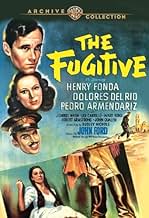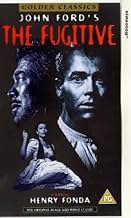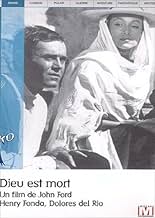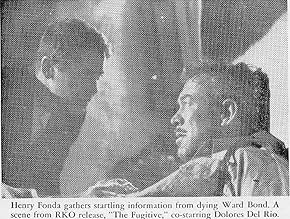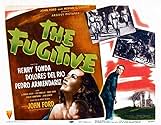IMDb RATING
6.3/10
2.8K
YOUR RATING
Anti-Catholic and anti-cleric policies in the Mexican state of Tabasco lead the revolutionary government to persecute the state's last remaining priest.Anti-Catholic and anti-cleric policies in the Mexican state of Tabasco lead the revolutionary government to persecute the state's last remaining priest.Anti-Catholic and anti-cleric policies in the Mexican state of Tabasco lead the revolutionary government to persecute the state's last remaining priest.
- Directors
- Writers
- Stars
- Awards
- 1 win & 2 nominations total
Dolores Del Río
- An Indian Woman
- (as Dolores Del Rio)
Pedro Armendáriz
- A Lieutenant of Police
- (as Pedro Armendariz)
Chris-Pin Martin
- An Organ-Grinder
- (as Cris-Pin Martin)
Miguel Inclán
- A Hostage
- (as Miguel Inclan)
Fernando Fernández
- A Singer
- (as Fernando Fernandez)
Rodolfo Acosta
- Policeman
- (uncredited)
Mel Ferrer
- Father Serra
- (uncredited)
Jack Pennick
- Man
- (uncredited)
José Torvay
- Mexican
- (uncredited)
- Directors
- Writers
- All cast & crew
- Production, box office & more at IMDbPro
Featured reviews
When Herbert J. Yates of Republic Pictures made a deal with John Ford to produce The Quiet Man he first made Ford agree to do one of his cavalry epics with John Wayne because he wanted a surefire moneymaker before taking a chance on The Quiet Man. The cavalry picture was Rio Grande.
He must have been talking to the folks at RKO who lost their collective shirts when the public stayed away in droves from The Fugitive. It got great critical acclaim and no box office at all.
My guess is that The Fugitive was sold all wrong or was made a year or two too early. If it had been sold as an anti-Communist as opposed to a pro-Catholic film it might have done better in those beginning years of The Cold War.
The Fugitive is based on a Graham Greene novel The Power and the Glory and it is about a priest in an unnamed South American country who is a fugitive because of his calling. An anti-clerical government has taken control of the country and they are doing their best to drive the Catholic religion out of the country.
Henry Fonda turns in a good sincere performance as the cleric, but he's about as convincingly Latino as Toshiro Mifune. The other members of the cast are well suited for their roles.
The best performance in the film is from that chameleon like actor J. Carrol Naish who could play any kind of nationality on the planet. He's the informer who rats out Henry Fonda to the police. Very similar to what Akim Tamiroff did to Gary Cooper in For Whom The Bells Toll and Naish's own performance in another Gary Cooper film, Beau Geste.
This was the first of three films Pedro Armendariz did with John Ford in an effort to broaden his appeal beyond Mexican cinema. Dolores Del Rio as his estranged wife was already familiar to American audiences from the silent screen.
The original novel by Greene had the priest as somewhat less than true to all his vows. He's a drinker and a womanizer. Del Rio's character is also quite tawdry. And this from Greene who was a well known Catholic lay person. But this Hollywood in the firm grip of The Code so a lot of what Greene wrote had to be softened by Ford for the screen. It lessened the impact of the film.
And with the whitewashing of Fonda's character came some rather heavy handed symbolism of Fonda as a Christlike figure.
Still The Fugitive might be worth a look for Ford, Greene, and Fonda fans.
He must have been talking to the folks at RKO who lost their collective shirts when the public stayed away in droves from The Fugitive. It got great critical acclaim and no box office at all.
My guess is that The Fugitive was sold all wrong or was made a year or two too early. If it had been sold as an anti-Communist as opposed to a pro-Catholic film it might have done better in those beginning years of The Cold War.
The Fugitive is based on a Graham Greene novel The Power and the Glory and it is about a priest in an unnamed South American country who is a fugitive because of his calling. An anti-clerical government has taken control of the country and they are doing their best to drive the Catholic religion out of the country.
Henry Fonda turns in a good sincere performance as the cleric, but he's about as convincingly Latino as Toshiro Mifune. The other members of the cast are well suited for their roles.
The best performance in the film is from that chameleon like actor J. Carrol Naish who could play any kind of nationality on the planet. He's the informer who rats out Henry Fonda to the police. Very similar to what Akim Tamiroff did to Gary Cooper in For Whom The Bells Toll and Naish's own performance in another Gary Cooper film, Beau Geste.
This was the first of three films Pedro Armendariz did with John Ford in an effort to broaden his appeal beyond Mexican cinema. Dolores Del Rio as his estranged wife was already familiar to American audiences from the silent screen.
The original novel by Greene had the priest as somewhat less than true to all his vows. He's a drinker and a womanizer. Del Rio's character is also quite tawdry. And this from Greene who was a well known Catholic lay person. But this Hollywood in the firm grip of The Code so a lot of what Greene wrote had to be softened by Ford for the screen. It lessened the impact of the film.
And with the whitewashing of Fonda's character came some rather heavy handed symbolism of Fonda as a Christlike figure.
Still The Fugitive might be worth a look for Ford, Greene, and Fonda fans.
It's been written somewhere that the cruelest thing you can say to an artist is that his work is flawless. John Ford thought of the Fugitive as, despite not being a box-office success, a perfect film and one of his very favorites. It's perhaps more than prudent then to point out some of the criticisms one would have of the film (which, perhaps, is moot since he's been dead for decades). As a fan of the Ford work I've seen there are some times when he's touched perfection (Grapes of Wrath and the Searchers are it for me), and sometimes not so much, which goes without saying he directed many films. With the Fugitive it's recognizable to me why it's split its audience: some hail it as being totally underrated and a brilliant depiction of religious allegory and suffering, and some say that it's a total crock for being far too heavy-handed and acted over-the-top.
Both sides have their right points; it is an underrated picture, if only for its technical feats of cinematography (Gabriel Figueroa is just right for this kind of material for Ford) and Ford's usual talents as a basic storyteller with a tendency for pure cinema expression (i.e. lack of dialog is a plus with the emotion expressed through the camera and actors. But it is also not well-acted in a couple of instances, notably the beautiful but overbearing Delores Del-Rio as the woman living in the town who's baby is baptized by the Priest played by Henry Fonda. For Fonda, it should be said, he at least gives all he can for a performance that possibly other actors could have played with more magnificence. In fact it's for him that some of the picture is most watchable, as he flexes his emotional chops for a scene where it's required for complexity like when he misses the boat and is asked to bless someone dying only to realize there is no wine and must go to ask from a vulgarian for wine (which, as it turns out, is drunken with brandy and all by him).
While it might not be the Fonda we all know and love from Grapes of Wrath or My Darling Clementine he does what he can with the part, and it's a tribute to him and Ford that they make it engrossing on a very simple level that carries some complex connotations. When focusing on the actual chase and flight from the Mexican police it works very well (particularly with a hammy but effective informer played by J. Carrol Nash). It's just when Ford over-indulges in the spiritual aspect of the picture, which is only made clearer towards the end, that it loses its footing. Indeed the start of the picture kind of threw me off for a little bit as Fonda comes in with the Christ-like symbolism highlighted on the wall, and the townspeople come in with tears in their eyes and a somber song to sing and Fonda blesses and baptizes others. I wondered: is this a little TOO much in the way of what Ford does best, which is telling the story? He can be brilliant in throwing in his deep-rooted Catholic ideas as pure visions on the screen, and once or twice in the Fugitive he does... and then other times it falls flat or goes too high where it starts to become a full-blown religious picture as opposed to a societal thriller.
Should Ford fans see it? Of course; even a lessor Ford picture will have something interesting. Will everyone like it? Surely not. Yet it is usually fine, traditional work and shouldn't be completely dismissed.
Both sides have their right points; it is an underrated picture, if only for its technical feats of cinematography (Gabriel Figueroa is just right for this kind of material for Ford) and Ford's usual talents as a basic storyteller with a tendency for pure cinema expression (i.e. lack of dialog is a plus with the emotion expressed through the camera and actors. But it is also not well-acted in a couple of instances, notably the beautiful but overbearing Delores Del-Rio as the woman living in the town who's baby is baptized by the Priest played by Henry Fonda. For Fonda, it should be said, he at least gives all he can for a performance that possibly other actors could have played with more magnificence. In fact it's for him that some of the picture is most watchable, as he flexes his emotional chops for a scene where it's required for complexity like when he misses the boat and is asked to bless someone dying only to realize there is no wine and must go to ask from a vulgarian for wine (which, as it turns out, is drunken with brandy and all by him).
While it might not be the Fonda we all know and love from Grapes of Wrath or My Darling Clementine he does what he can with the part, and it's a tribute to him and Ford that they make it engrossing on a very simple level that carries some complex connotations. When focusing on the actual chase and flight from the Mexican police it works very well (particularly with a hammy but effective informer played by J. Carrol Nash). It's just when Ford over-indulges in the spiritual aspect of the picture, which is only made clearer towards the end, that it loses its footing. Indeed the start of the picture kind of threw me off for a little bit as Fonda comes in with the Christ-like symbolism highlighted on the wall, and the townspeople come in with tears in their eyes and a somber song to sing and Fonda blesses and baptizes others. I wondered: is this a little TOO much in the way of what Ford does best, which is telling the story? He can be brilliant in throwing in his deep-rooted Catholic ideas as pure visions on the screen, and once or twice in the Fugitive he does... and then other times it falls flat or goes too high where it starts to become a full-blown religious picture as opposed to a societal thriller.
Should Ford fans see it? Of course; even a lessor Ford picture will have something interesting. Will everyone like it? Surely not. Yet it is usually fine, traditional work and shouldn't be completely dismissed.
There are essentially two ways in which to view this movie.
The first one is to compare and contrast this film with the novel from which it is loosely inspired, "The Power and the Glory" by Graham Greene. This would unfortunately lead to disappointment and a poor understanding of John Ford's motives in making this movie. While the characters and situation are indeed taken from the book, The Fugitive is radically different, not just in the manner in which the main characters are treated, but more importantly, in the message it carries. While Greene's masterpiece described how even the most outwardly depraved and despicable of human beings can be redeemed by their last actions of faith and sacrifice, John Ford was more concerned with showing how circumstances may transform a cowardly priest into a martyr for the faith. While these two themes may be related, they reveal a difference in their respective author's world view and understanding of faith and redemption. It may be argued that the code of those days would not have permitted the showing of an alcoholic and adulterous priest on screen, but this would be misunderstanding the fundamental philosophy of John Ford, whose relatively conservative views in matters of morality would have recoiled at such an idea.
This brings us to the second way in which this movie can be enjoyed and appreciated, namely as John Ford's labour of love and guilty pleasure. It has been said that, of all the masterpieces he created with Henry Fonda and others, and there were many, The Fugitive was one of his all-time personal favorites, even though it was never a popular, nor critical success. Ford projected in his version of the story many of his personal trips regarding his faith. Allegories, and barely subtle Christ references abound in this movie, though never in a simple, nor trite manner. Rather, it is a beautifully-made story of a man's journey from fear and doubt to a better understanding of his role, no matter how modest, in the grand affairs of the world.
The photography is truly a work of art, masterfully using light and shadows, brightness and dark, close-ups of faces distorted by anguish and halos of figures resembling statues in church alcoves. Fonda's performance, always perfect, reaches new heights here. His mastery at containing emotions, while letting them seep through the audience, undiluted, gives this particular characterization extraordinary strength and complexity. It would have been tempting to interpret the priest as an almost static character, given the subject matter. Instead, while his priest was neither alcoholic, nor adulterous, he displays an even greater weakness and flaw of character: lack of faith, profound self-doubt and abject cowardice. His fears, doubts and anguish and his gradual descent into debasement, are in many ways more disturbing since they are in direct conflict with the sacrifices and moral strength demanded of a priest during religious persecution.
Dolores del Rio is magnificent in her Mary-Magdalena characterization, as Pedro Amendariz, superb as the perennial Judas torn by love, hate, jealousy, and fear. There is very little dialogue, and unlike many of Ford's movie, very little of the usual comic relief which often balances dramatic moments. Yet, there is never a dull or unnecessary scene.
John Ford has crafted in this movie something better than a faithful rendition of "The Power and The Glory". Indeed, The Fugitive is a beautiful, heartfelt story about humanity's frailty and its struggle to find strength and redemption in times of crisis. In this sense it is after all a wonderful tribute to Graham Greene's novel.
The first one is to compare and contrast this film with the novel from which it is loosely inspired, "The Power and the Glory" by Graham Greene. This would unfortunately lead to disappointment and a poor understanding of John Ford's motives in making this movie. While the characters and situation are indeed taken from the book, The Fugitive is radically different, not just in the manner in which the main characters are treated, but more importantly, in the message it carries. While Greene's masterpiece described how even the most outwardly depraved and despicable of human beings can be redeemed by their last actions of faith and sacrifice, John Ford was more concerned with showing how circumstances may transform a cowardly priest into a martyr for the faith. While these two themes may be related, they reveal a difference in their respective author's world view and understanding of faith and redemption. It may be argued that the code of those days would not have permitted the showing of an alcoholic and adulterous priest on screen, but this would be misunderstanding the fundamental philosophy of John Ford, whose relatively conservative views in matters of morality would have recoiled at such an idea.
This brings us to the second way in which this movie can be enjoyed and appreciated, namely as John Ford's labour of love and guilty pleasure. It has been said that, of all the masterpieces he created with Henry Fonda and others, and there were many, The Fugitive was one of his all-time personal favorites, even though it was never a popular, nor critical success. Ford projected in his version of the story many of his personal trips regarding his faith. Allegories, and barely subtle Christ references abound in this movie, though never in a simple, nor trite manner. Rather, it is a beautifully-made story of a man's journey from fear and doubt to a better understanding of his role, no matter how modest, in the grand affairs of the world.
The photography is truly a work of art, masterfully using light and shadows, brightness and dark, close-ups of faces distorted by anguish and halos of figures resembling statues in church alcoves. Fonda's performance, always perfect, reaches new heights here. His mastery at containing emotions, while letting them seep through the audience, undiluted, gives this particular characterization extraordinary strength and complexity. It would have been tempting to interpret the priest as an almost static character, given the subject matter. Instead, while his priest was neither alcoholic, nor adulterous, he displays an even greater weakness and flaw of character: lack of faith, profound self-doubt and abject cowardice. His fears, doubts and anguish and his gradual descent into debasement, are in many ways more disturbing since they are in direct conflict with the sacrifices and moral strength demanded of a priest during religious persecution.
Dolores del Rio is magnificent in her Mary-Magdalena characterization, as Pedro Amendariz, superb as the perennial Judas torn by love, hate, jealousy, and fear. There is very little dialogue, and unlike many of Ford's movie, very little of the usual comic relief which often balances dramatic moments. Yet, there is never a dull or unnecessary scene.
John Ford has crafted in this movie something better than a faithful rendition of "The Power and The Glory". Indeed, The Fugitive is a beautiful, heartfelt story about humanity's frailty and its struggle to find strength and redemption in times of crisis. In this sense it is after all a wonderful tribute to Graham Greene's novel.
I was attracted to this movie because of Henry Fonday, Dolores del Rio, and John Ford, all of whom I'm a fan. But this movie was just so WEIRD. From the start, I felt like I had joined the movie in the middle. The dramatic music along the walk and as he enters the church - it feels like a crucial point in a movie, but we don't even know what's going on yet. There are long periods with no dialogue, almost has the feel of a silent movie at times.
I found the whole movie depressing without any redeeming character development that would have made me sympathize with the characters. Why is Fonda, a white priest, even in this country in the first place? It's never explained. And he lets everyone take the fall for him. He's not likable or relatable in any way to me.
I found the whole movie depressing without any redeeming character development that would have made me sympathize with the characters. Why is Fonda, a white priest, even in this country in the first place? It's never explained. And he lets everyone take the fall for him. He's not likable or relatable in any way to me.
Hmmm, let's see... we've got a movie about a Catholic priest trying to exercise his ministry in a Latin American country whose government has been taken over by an anticlerical revolutionary party,... he administers the sacraments to the devoutly believing people while trying to stay one step ahead of the law, which has hunted down every other priest in the country,... what do you this movie will be like?
In the hands of the crusty but sentimental John Ford, you might expect this movie to be some kind of hagiography, showing the priest as he performs his pastoral labors with fierce courage as well as with patient devotion, and anticipates his fate with Christian resignation. (This would be particularly apt if Pat O'Brien or Spencer Tracy played the priest.) You might also expect the people he serves will be portrayed as simple God-fearing people with stout hearts and no illusions about the true intentions of their political leaders. The government and its agents will be portrayed as cruel and cynical tyrants, ever ready to beat on the simple folk in the name of the greater good.
Fortunately, this is not the movie that Ford made. The actual movie is a good deal more complicated (and much, much better) than that. This is a balanced, intelligent account of a tragic situation born of centuries of misrule and oppression by tyrannical government working, sad to say, hand in glove with the Church that is supposed to comfort the afflicted and afflict the comfortable. Pedro Amendariz in particular gives a great performance as the revolutionary government official, who, whatever his opinions may be, passionately loves his country, and sincerely wants the best for his beleaguered people. Henry Fonda, as the priest, gives at one point a stunning assessment of his motives for what he does which turns any picture of a heroic shepherd on its ear.
This is one of John Ford's lesser known pictures - an unknown masterpiece.
In the hands of the crusty but sentimental John Ford, you might expect this movie to be some kind of hagiography, showing the priest as he performs his pastoral labors with fierce courage as well as with patient devotion, and anticipates his fate with Christian resignation. (This would be particularly apt if Pat O'Brien or Spencer Tracy played the priest.) You might also expect the people he serves will be portrayed as simple God-fearing people with stout hearts and no illusions about the true intentions of their political leaders. The government and its agents will be portrayed as cruel and cynical tyrants, ever ready to beat on the simple folk in the name of the greater good.
Fortunately, this is not the movie that Ford made. The actual movie is a good deal more complicated (and much, much better) than that. This is a balanced, intelligent account of a tragic situation born of centuries of misrule and oppression by tyrannical government working, sad to say, hand in glove with the Church that is supposed to comfort the afflicted and afflict the comfortable. Pedro Amendariz in particular gives a great performance as the revolutionary government official, who, whatever his opinions may be, passionately loves his country, and sincerely wants the best for his beleaguered people. Henry Fonda, as the priest, gives at one point a stunning assessment of his motives for what he does which turns any picture of a heroic shepherd on its ear.
This is one of John Ford's lesser known pictures - an unknown masterpiece.
Did you know
- GoofsWhen the Priest is on line getting ready to board a ship, he is approached by a young boy that was baptized by him. The boy informs him that his mother is dying and wishes for the priest to come home with him to give her the last rites. What is not explained is how did the boy just happen to know that the priest was in town and getting ready to board a ship at that precise moment and in the third class section.
- Quotes
A Lieutenant of Police: [Looking at news clipping] You can tell he's a priest by the collar, that's all.
A Chief of Police: Not a very good picture, but it's what we got.
A Lieutenant of Police: They all look alike to me. I've shot him a dozen times.
- ConnectionsFeatured in John Ford (1992)
- SoundtracksBury Me Not on the Lone Prairie
("The Dying Cowboy") (uncredited)
American folk ballad based on an older sea song (1932)
Variation heard as theme for the Gringo (Ward Bond)
- How long is The Fugitive?Powered by Alexa
Details
Box office
- Budget
- $1,500,000 (estimated)
- Runtime
- 1h 44m(104 min)
- Color
- Aspect ratio
- 1.37 : 1
Contribute to this page
Suggest an edit or add missing content

